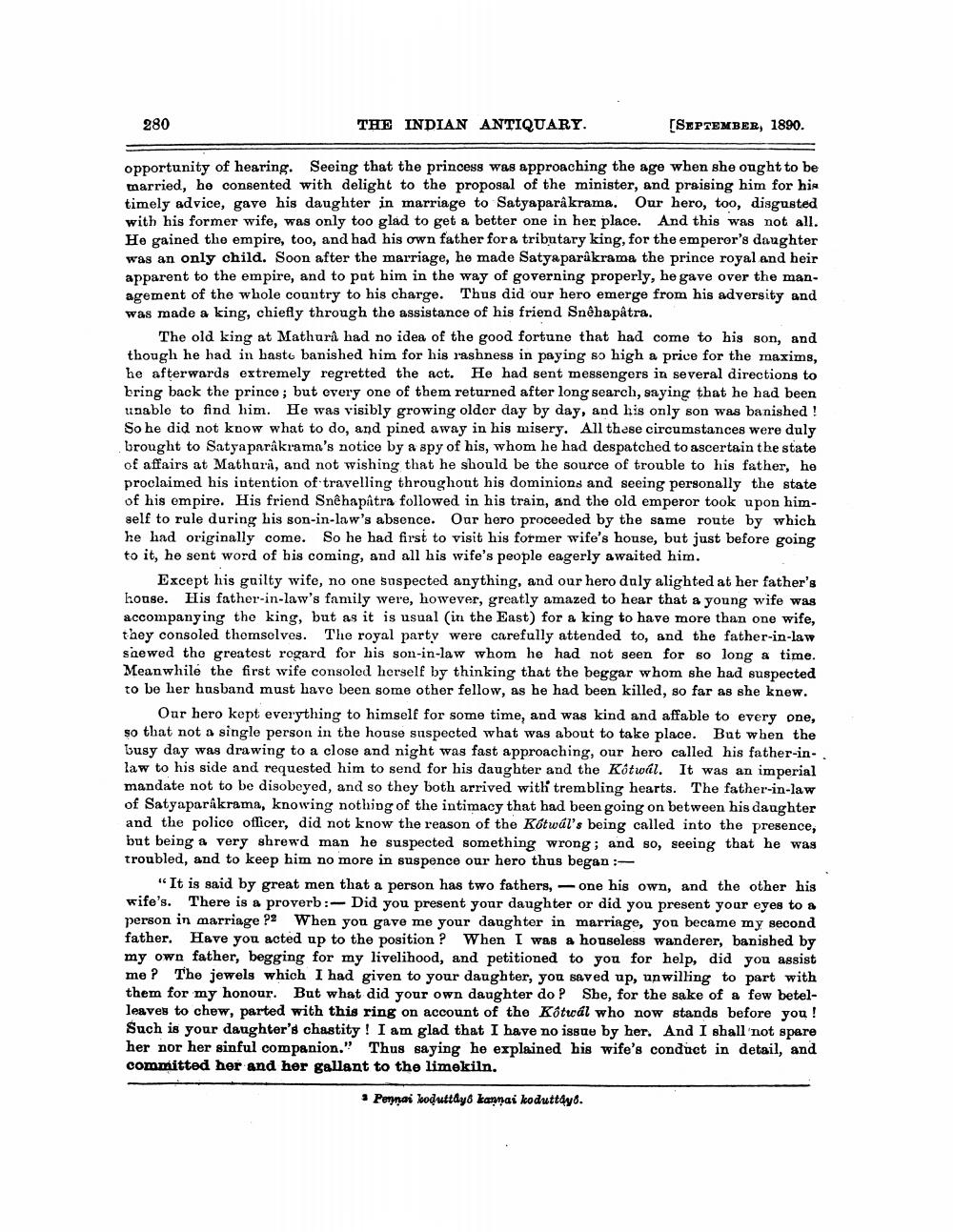________________
280
[SEPTEMBER, 1890.
opportunity of hearing. Seeing that the princess was approaching the age when she ought to be married, he consented with delight to the proposal of the minister, and praising him for his timely advice, gave his daughter in marriage to Satyaparakrama. Our hero, too, disgusted with his former wife, was only too glad to get a better one in her place. And this was not all. He gained the empire, too, and had his own father for a tributary king, for the emperor's daughter was an only child. Soon after the marriage, he made Satyaparakrama the prince royal and heir apparent to the empire, and to put him in the way of governing properly, he gave over the management of the whole country to his charge. Thus did our hero emerge from his adversity and was made a king, chiefly through the assistance of his friend Snêhapâtra.
THE INDIAN ANTIQUARY.
The old king at Mathurâ had no idea of the good fortune that had come to his son, and though he had in haste banished him for his rashness in paying so high a price for the maxims, he afterwards extremely regretted the act. He had sent messengers in several directions to bring back the prince; but every one of them returned after long search, saying that he had been unable to find him. He was visibly growing older day by day, and his only son was banished! So he did not know what to do, and pined away in his misery. All these circumstances were duly brought to Satyaparakrama's notice by a spy of his, whom he had despatched to ascertain the state of affairs at Mathara, and not wishing that he should be the source of trouble to his father, he proclaimed his intention of travelling throughout his dominions and seeing personally the state of his empire. His friend Snêhapâtra followed in his train, and the old emperor took upon himself to rule during his son-in-law's absence. Our hero proceeded by the same route by which he had originally come. So he had first to visit his former wife's house, but just before going to it, he sent word of his coming, and all his wife's people eagerly awaited him.
Except his guilty wife, no one suspected anything, and our hero duly alighted at her father's house. His father-in-law's family were, however, greatly amazed to hear that a young wife was accompanying the king, but as it is usual (in the East) for a king to have more than one wife, they consoled themselves. The royal party were carefully attended to, and the father-in-law saewed the greatest regard for his son-in-law whom he had not seen for so long a time. Meanwhile the first wife consoled herself by thinking that the beggar whom she had suspected to be her husband must have been some other fellow, as he had been killed, so far as she knew.
Our hero kept everything to himself for some time, and was kind and affable to every one, so that not a single person in the house suspected what was about to take place. But when the busy day was drawing to a close and night was fast approaching, our hero called his father-inlaw to his side and requested him to send for his daughter and the Kotwal. It was an imperial mandate not to be disobeyed, and so they both arrived with trembling hearts. The father-in-law of Satyaparakrama, knowing nothing of the intimacy that had been going on between his daughter and the police officer, did not know the reason of the Kotwal's being called into the presence, but being a very shrewd man he suspected something wrong; and so, seeing that he was troubled, and to keep him no more in suspence our hero thus began:
"It is said by great men that a person has two fathers, one his own, and the other his wife's. There is a proverb: Did you present your daughter or did you present your eyes to a person in marriage ?2 When you gave me your daughter in marriage, you became my second father. Have you acted up to the position? When I was a houseless wanderer, banished by my own father, begging for my livelihood, and petitioned to you for help, did you assist me? The jewels which I had given to your daughter, you saved up, unwilling to part with them for my honour. But what did your own daughter do? She, for the sake of a few betelleaves to chew, parted with this ring on account of the Kotwal who now stands before you! Such is your daughter's chastity! I am glad that I have no issue by her. And I shall not spare her nor her sinful companion." Thus saying he explained his wife's conduct in detail, and committed her and her gallant to the limekiln.
Pennai koduttayo kannai koduttayo.




